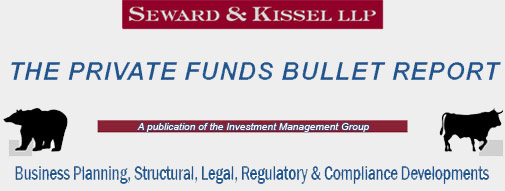
- Hedge fund managers may no longer defer fee income from offshore funds attributable to services performed after January 1, 2009. Managers may wish to consider replacing the incentive fees paid by their offshore funds with incentive allocations, which under current law receive pass-through tax treatment and are not subject to NYC unincorporated business tax (currently 4%) or Federal self-employment tax (about 2.9%). The offshore incentive allocation structure needs to be implemented in a “master fund” (usually offshore) entity taxed as a partnership. Transferring assets, if needed, to a master fund may result in administrative, tax and counterparty issues.
- Offshore funds with June 30 fiscal year ends generally should transition to a December 31 fiscal year in connection with the change to the incentive allocation and, ideally, the change should take place by December 31, 2008.
- Offshore fund managers may be able to take advantage of a special transition rule either to (i) optimize the length of their deferrals (to a date no later than December 31, 2017) with respect to certain deferred fees (generally fees earned subsequent to 2004) or (ii) accelerate payment of such fees into 2009 (or a later year). This transition rule expires on December 31, 2008. To change prior fee deferral elections, managers typically must amend their plan to provide for the new elections and then make the new elections on or before December 31, 2008.
- Managers should review the terms of any deferred compensation arrangements that they have with their offshore funds or with their employees to determine whether any amendments need to be made prior to December 31, 2008 in order to comply with the provisions of Internal Revenue Code Section 409A.
- Going forward, since managers can no longer defer their own compensation from offshore funds (as discussed above), they may also need to restructure their existing employee deferred compensation plans for future years to (i) avoid the negative tax result of paying tax currently on their own income without any current deduction for the deferred compensation owed to employees, and (ii) address their inability to hedge the investment returns owed to the employees with respect to the deferred compensation.